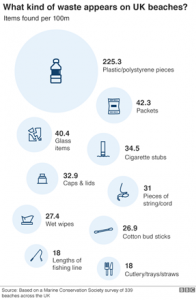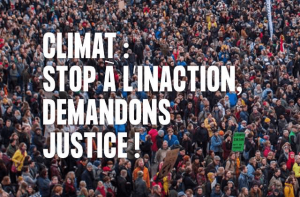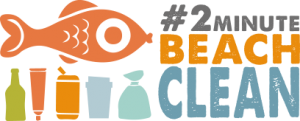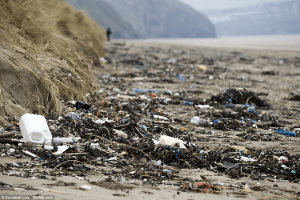Plastic has become incorporated into our daily lives, however the amount that is produced and carelessly discarded has had a damaging effect on marine life globally. 8 million pieces of plastic enters oceans every single day, which is severely damaging to our marine life. Although plastic is cheap to produce and extremely useful, our planet is suffering from this material that can take hundreds of years to break down into microscopic pieces, which is consumed by marine animals. As plastic is so durable and cheap companies often produce products in mass without a second thought, consumers continue to buy these products and discard them carelessly.
Plastic build up within our oceans is a continuous problem, two-thirds of it comes from land-based sources. Therefore, many of it is litter left behind on beaches, washed down rivers or drains due to litter from towns, litter flushed down the loo and landfill sites near the coast.
Marine life is suffering from the constant plastic that they are consuming, animals often mistake it for food and consume the fatal plastic, causing it to stay in their stomachs and eventually harm the animals. This is extremely damaging to both animals and individuals who consume fish in their diet. The European Food Safety reported a risk to human health and food safety in 2016 as “given the potential for micro-plastic pollution in edible tissues of commercial fish.” Unless there is a decrease in plastic pollution, marine life will continue to consume plastic harming both themselves and individuals consuming UK-caught fish. Due to plastic never truly decomposing, it breaks down into microscopic pieces that tiny marine life such as plankton consume. Once these animals become infected by the plastic, larger animals who eat them as food also are harmed.
Surfers Against Sewage found around:
“100,000 marine mammals and turtles and 1 million sea birds are killed by marine plastic pollution annually.”
These numbers are extremely high due to millions of pieces of plastic entering the ocean daily. It was also found that plastic was found in “100% of marine turtles, 59% of whales, 36% of seals and 40% of seabird species examined.” These species are slowly becoming endangered, marine life could be helped if plastic was continuously cleared from seaside areas and individuals took more care when recycling and disposing of these products. Large companies such as Coco-Cola are also a main contributor towards the plastic waste as over 150 plastic bottles are found littering each mile of UK Beaches. Well-known corporations and businesses can contribute towards reducing plastic pollution by cutting down their use of plastic, for example removing single use plastic bags, plastic straws and plastic cups. Each of these items if switched to environmentally friendly material but companies globally, plastic pollution will reduce.
Beach clean ups is one-way local communities can help towards clearing beaches and the ocean of unwanted plastic pollution. Bournemouth is one area that has regular beach clean ups with over 500 volunteers helping in 2018. They were able to clear 350 bags of rubbish from Dorset’s beaches. These locals were able to host 17 beach clean ups, along Dorset coast from April 21st to 22nd. This is one method in the right direction, regular clean ups alongside stricter regulations on UK beaches can help to cut down on plastic pollution in the ocean.
Written by: Tasnim Islam



